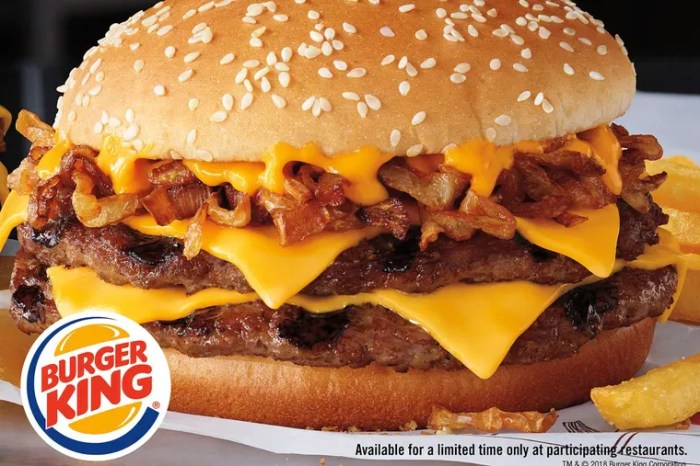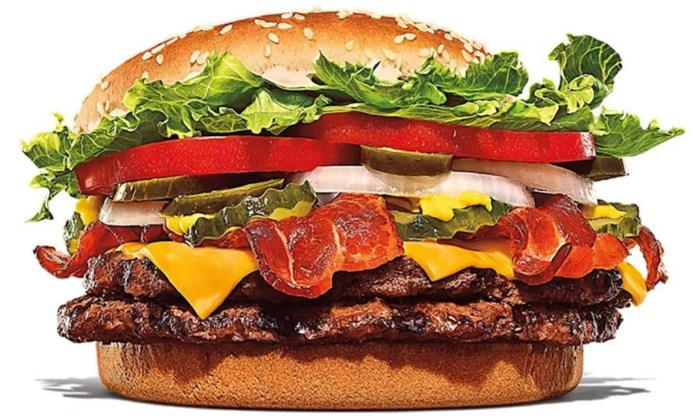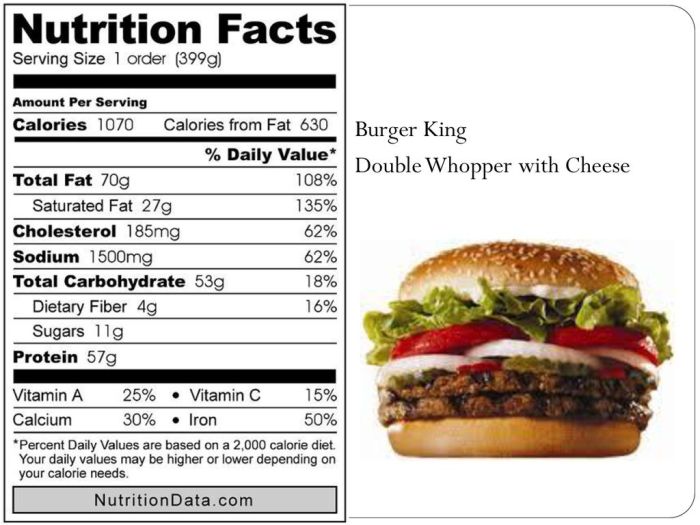Nutritional Information Overview

Burger king whopper with cheese nutrition – The Burger King Whopper with Cheese is a popular fast-food item, but its nutritional profile is crucial for consumers making informed dietary choices. Understanding the caloric content, macronutrient breakdown, and sodium levels is essential for managing weight and overall health. This section provides a detailed analysis of the nutritional information, considering serving size and potential variations.
Nutritional data can vary slightly depending on the source and preparation methods. The following information is based on average values reported by Burger King and should be considered an approximation.
Whopper with Cheese Nutritional Content
The following table presents the nutritional information for a standard Burger King Whopper with Cheese, based on a typical serving size. Note that these values are subject to minor fluctuations depending on location and preparation.
| Name | Amount | % Daily Value | Unit |
|---|---|---|---|
| Calories | 660 | 33% | kcal |
| Total Fat | 39g | 50% | g |
| Saturated Fat | 16g | 80% | g |
| Cholesterol | 90mg | 30% | mg |
| Sodium | 1060mg | 44% | mg |
| Total Carbohydrate | 46g | 15% | g |
| Dietary Fiber | 2g | 8% | g |
| Total Sugars | 12g | – | g |
| Protein | 28g | – | g |
Serving Size: One (1) Whopper with Cheese sandwich.
Nutritional Variations
Nutritional content can differ based on variations in the Whopper with Cheese. For example, a smaller size, such as a Junior Whopper with Cheese, would naturally contain fewer calories, fat, and other nutrients. Similarly, opting for a different bun option, if available, could also slightly alter the nutritional profile. Specific nutritional information for these variations should be checked directly with Burger King or on their official website.
Macronutrient Analysis
The Burger King Whopper with Cheese, a quintessential fast-food burger, presents a macronutrient profile reflective of its ingredients: a beef patty, cheese, buns, condiments, and vegetables. Understanding this profile is crucial for consumers making informed dietary choices. This analysis delves into the specific breakdown and compares it to similar offerings.The Whopper with Cheese typically contains a significant proportion of fat, followed by carbohydrates and then protein.
The exact percentages vary slightly depending on the specific preparation and location, but a general representation offers valuable insight into its nutritional makeup. For instance, a standard Whopper with Cheese might contain approximately 50% fat, 35% carbohydrates, and 15% protein from its total calories. This is a broad approximation and should not be considered definitive without referring to the most up-to-date nutritional information available from Burger King.
Macronutrient Percentage Breakdown
A typical Whopper with Cheese boasts a high fat content primarily derived from the beef patty and cheese. The bun contributes significantly to the carbohydrate percentage, along with any added sauces and condiments. The protein component originates mainly from the beef patty. To visualize this, imagine a pie chart: approximately half the chart would represent fat, a slightly smaller segment representing carbohydrates, and a smaller segment representing protein.
This visual representation underscores the burger’s high-fat nature.
Comparison to Other Fast-Food Burgers
Compared to other fast-food burgers, the Whopper with Cheese generally falls within the higher range of fat content. While many fast-food burgers share a similar macronutrient profile dominated by fat and carbohydrates, the Whopper with Cheese often shows a relatively higher fat percentage than leaner options, such as those featuring grilled chicken patties or smaller beef patties. For example, a chicken burger might show a significantly lower fat percentage, with a higher proportion of protein and potentially a similar or slightly lower carbohydrate content.
Conversely, other similarly sized beef burgers might exhibit a comparable, or even slightly higher, fat percentage. The differences primarily arise from variations in patty size, cooking methods, and the types of cheese and condiments used.
Visual Representation of Macronutrient Proportions, Burger king whopper with cheese nutrition
Imagine a circle divided into three sections. The largest section, roughly half the circle, is colored dark red to represent fat. Adjacent to it is a smaller, light brown section representing carbohydrates, about 35% of the circle. The remaining, smallest section, approximately 15% of the circle, is colored light pink to represent protein. This visual representation clearly illustrates the dominant role of fat in the Whopper with Cheese’s macronutrient composition.
Micronutrient Content

The Whopper with Cheese, like many fast-food items, provides a range of micronutrients, though the quantities and balance may not align perfectly with recommended daily intakes. Understanding the micronutrient profile is crucial for assessing its contribution to overall dietary needs. It’s important to remember that this analysis is based on a single serving and should be considered within the context of a broader dietary pattern.The following section details the key micronutrients found in a Whopper with Cheese and explores their potential health implications.
The Whopper’s weighty presence, a greasy comfort, a fleeting solace, mirrors the quiet sadness of its calorie count. A stark contrast perhaps, to the creamy, cheesy allure of Panera’s mac and cheese, whose nutritional details you can find here: panera bread mac and cheese nutrition , a different kind of indulgence, yet equally fleeting. Ultimately, both leave a lingering emptiness, a melancholic echo in the stomach’s hollow ache after the last bite of the Whopper’s cheesy embrace.
Note that precise micronutrient content can vary slightly depending on ingredient sourcing and preparation methods.
Key Micronutrients in a Whopper with Cheese
While not a primary source of micronutrients, a Whopper with Cheese does contain several vitamins and minerals, albeit in varying amounts. These micronutrients play vital roles in various bodily functions.
- Iron: Contributes to red blood cell formation and oxygen transport. The heme iron from the beef may be more readily absorbed than non-heme iron from plant sources. However, the overall amount is modest compared to recommended daily intake.
- Vitamin B12: Essential for nerve function and red blood cell formation. The beef patty is a source of this vitamin, which is crucial for vegetarians and vegans who often need supplementation.
- Niacin (Vitamin B3): Plays a role in energy metabolism and DNA repair. Present in both the beef and cheese components.
- Riboflavin (Vitamin B2): Involved in energy production and cellular function. Found in small quantities in the beef and cheese.
- Zinc: Supports immune function and wound healing. Present in the beef patty.
Health Implications of Micronutrient Content
The micronutrient profile of a Whopper with Cheese presents a mixed bag in terms of health implications. While it provides some essential vitamins and minerals, the overall quantity is relatively low, and the high fat and sodium content may outweigh the benefits of these micronutrients.
The high saturated fat content, for instance, can negatively impact cardiovascular health, potentially offsetting any positive contributions from the micronutrients. Similarly, the sodium content can contribute to high blood pressure in susceptible individuals. Therefore, regular consumption of a Whopper with Cheese as a significant part of one’s diet should be approached with caution.
Micronutrient Significance and Daily Recommended Intake
The amounts of micronutrients in a Whopper with Cheese are generally small compared to the recommended daily allowances (RDAs). For example, the iron content may provide a small percentage of the RDA, while other micronutrients like vitamin B12 contribute a more significant, but still relatively small, percentage. It’s crucial to understand that relying on fast food for micronutrient intake is not advisable, as it may lead to deficiencies in other essential nutrients.
To maintain optimal health, it is essential to consume a balanced diet rich in fruits, vegetables, whole grains, and lean proteins to meet the daily recommended intake of various micronutrients. A Whopper with Cheese should be considered an occasional treat, not a staple in a healthy diet.
Comparison with Competitors: Burger King Whopper With Cheese Nutrition

The nutritional profile of the Burger King Whopper with Cheese is best understood in the context of its competitors. Direct comparison with similar offerings from other fast-food chains highlights both its strengths and weaknesses regarding caloric content, macronutrient composition, and sodium levels. This analysis allows consumers to make informed choices based on their individual dietary needs and preferences.
Analyzing the nutritional data reveals significant variations among seemingly similar products. While all these burgers offer a satisfying, indulgent experience, their impact on one’s daily nutritional intake differs considerably. This section provides a direct comparison of the Burger King Whopper with Cheese against a prominent competitor, focusing on key nutritional metrics.
Nutritional Comparison of Similar Burgers
The following table compares the Burger King Whopper with Cheese to McDonald’s Big Mac, focusing on calories and sodium content. These two burgers represent flagship products for their respective chains and serve as a suitable benchmark for comparison. Note that nutritional information can vary slightly depending on location and preparation methods.
| Restaurant | Burger Name | Calories | Sodium (mg) |
|---|---|---|---|
| Burger King | Whopper with Cheese | 670 | 1060 |
| McDonald’s | Big Mac | 590 | 970 |
The data shows the Whopper with Cheese contains approximately 80 more calories and 90 more milligrams of sodium than the Big Mac. While these differences may seem relatively small in isolation, they can accumulate over time and significantly impact overall dietary intake.
Impact of Nutritional Differences on Consumer Choices
The differences in caloric and sodium content between the Whopper with Cheese and the Big Mac can significantly influence consumer choices. Health-conscious consumers might opt for the Big Mac due to its lower calorie and sodium count. However, taste preferences, perceived value, and other factors also play a significant role in consumer decisions. For example, some individuals might prioritize taste and convenience over strict nutritional considerations, even if the Whopper with Cheese contains more calories and sodium.
Furthermore, the price difference between the two burgers can also influence consumer choices. If the price difference is minimal, consumers might choose the option with a better nutritional profile. However, if the price difference is substantial, consumers might prioritize affordability over nutritional value. This underscores the complex interplay of factors that determine consumer preferences in the fast-food market.
Expert Answers
What are the potential long-term health effects of regularly consuming a Whopper with Cheese?
Regular consumption of high-calorie, high-sodium, and high-saturated-fat foods like the Whopper with Cheese can increase the risk of weight gain, heart disease, type 2 diabetes, and other health problems over time. It’s best enjoyed occasionally as part of a balanced diet.
Are there vegetarian or vegan alternatives to the Whopper with Cheese at Burger King?
Burger King offers vegetarian options, but not a direct vegan or vegetarian equivalent to the Whopper with Cheese. Check their menu for current vegetarian choices.
How does the nutritional content of the Whopper with Cheese compare to a homemade burger?
The nutritional content can vary significantly. Homemade burgers allow for greater control over ingredients, potentially resulting in a healthier option with less sodium, saturated fat, and added sugars, depending on the ingredients used.
Does the Whopper with Cheese contain any common allergens?
Yes, the Whopper with Cheese contains common allergens such as gluten (from the bun), dairy (from the cheese), and soy (often present in processed foods used in the burger). Always check the detailed allergen information available from Burger King before consumption if you have allergies.
